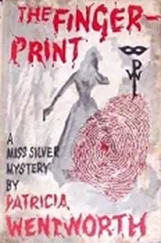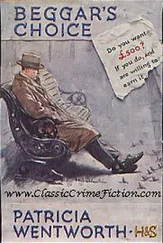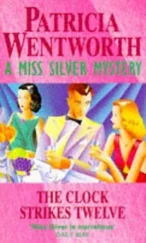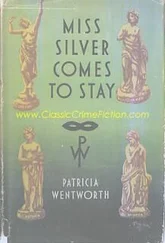Patricia Wentworth - Pilgrim’s Rest
Здесь есть возможность читать онлайн «Patricia Wentworth - Pilgrim’s Rest» весь текст электронной книги совершенно бесплатно (целиком полную версию без сокращений). В некоторых случаях можно слушать аудио, скачать через торрент в формате fb2 и присутствует краткое содержание. Жанр: Классический детектив, на английском языке. Описание произведения, (предисловие) а так же отзывы посетителей доступны на портале библиотеки ЛибКат.
- Название:Pilgrim’s Rest
- Автор:
- Жанр:
- Год:неизвестен
- ISBN:нет данных
- Рейтинг книги:5 / 5. Голосов: 1
-
Избранное:Добавить в избранное
- Отзывы:
-
Ваша оценка:
- 100
- 1
- 2
- 3
- 4
- 5
Pilgrim’s Rest: краткое содержание, описание и аннотация
Предлагаем к чтению аннотацию, описание, краткое содержание или предисловие (зависит от того, что написал сам автор книги «Pilgrim’s Rest»). Если вы не нашли необходимую информацию о книге — напишите в комментариях, мы постараемся отыскать её.
Pilgrim’s Rest — читать онлайн бесплатно полную книгу (весь текст) целиком
Ниже представлен текст книги, разбитый по страницам. Система сохранения места последней прочитанной страницы, позволяет с удобством читать онлайн бесплатно книгу «Pilgrim’s Rest», без необходимости каждый раз заново искать на чём Вы остановились. Поставьте закладку, и сможете в любой момент перейти на страницу, на которой закончили чтение.
Интервал:
Закладка:
Lesley Freyne looked up in surprise as the door opened and her elderly maid announced,
“Captain Pilgrim-”
She came to meet him with both hands out.
“Jerome, my dear-how delightful!”
He had left his outdoor things in the hall. He leaned his stick against a chair and took her outstretched hands.
“Let’s sit down, Les-here, on the sofa.” Then, when they were seated and her expression had changed to one of grave enquiry, “My dear, I’ve come to tell you something.”
Her colour failed a little.
“What is it, Jerome? Miss Columba rang me up about Jack.”
“It isn’t Jack, my dear.”
He was still holding her hands. She felt him press them strongly. She said quite low,
“Then it’s Henry-”
“Yes.”
She drew her hands away, looked down at them, and said,
“He’s dead.”
“Yes, my dear.”
A minute went by before she spoke again.
“Will you tell me?”
“Les, he’s been dead a long time.”
“How long?”
“Three years.”
She looked up at him then and caught her breath.
“Since that night?”
“Yes.”
“How?”
“Les, you’re so awfully brave-”
She said, “Tell me.”
“He was murdered. They think stabbed.”
“Oh-” It was just a long, shaken breath.
“They’ve found his body. March had the cellars searched. He was there-in the little cellar at the far end, behind the furniture.”
He took her hands again, and she let him hold them.
“All this time-” she said. “Oh, Jerome!”
There was a long pause. Before either of them moved to end it a knock came at the door. Lesley got up and went to it. Jerome heard her speaking in a quiet, ordinary voice. He couldn’t hear who spoke to her, or what was said, only Lesley’s voice making its quiet answer,
“No, I can’t come just now. I have Captain Pilgrim here… Tell her she mustn’t do that. It would disappoint me very much. Tell her to remember what she promised.”
She shut the door and came back to him.
“Jerome-who did it?”
“I don’t know.”
“Who would have done it? I can’t think. I don’t seem to be able to think or to feel. It’s-it’s such a shock. It doesn’t seem possible. I thought he was dead-I’ve thought that for a long time now-but I never thought of this.”
“My poor dear!”
She looked at him steadily.
“No-don’t be too sorry for me. It isn’t like that. I want to tell you-I wasn’t going to marry him.”
“You weren’t?”
“No. Something happened-it doesn’t matter now. I felt I couldn’t go on. If he had come to see me that night, I should have told him so. But he didn’t come.”
“Does anyone else know this?”
“No.”
“Then I should keep it like that.”
“I’ll see. I won’t say anything if I can help it. But they’ll ask questions. I won’t lie about it.”
“You told them before that the disagreement between you wasn’t a serious one.”
“It wasn’t-in itself. And then something happened-I felt I couldn’t go on. When Henry rang up and said he was coming round to see me I made up my mind to break our engagement. Then when he disappeared and it was all so public I thought what was the good of making it any worse. It wasn’t as if I had actually broken with Henry-he didn’t even know I was going to, so it didn’t account for his going. It was just in my own mind. I’ve never told anyone but you.”
chapter 22
Frank Abbott came down next day. He was closeted with March and Miss Silver for half an hour, after which Robbins was sent for. He came in looking very much as usual. Features so marked and a complexion so sallow do not readily give a man’s feelings away.
Frank had his notebook ready, and wrote in it as the questioning went on.
“You know that a body was found in the cellars yesterday?”
“Yes, sir.”
“Do you know whose body it was?”
“I suppose, sir, that it would be Mr. Henry.” He cleared his throat. “It was a great shock to us all.”
“What makes you suppose that it was Mr. Henry Clayton’s body?”
“It is generally supposed, sir.”
“I asked what made you suppose so.”
“I can hardly say-it came into my mind.”
“You heard that a body had been found, and it came into your mind that it was Mr. Clayton’s body?”
“Yes, sir.”
“Why?”
With no change of expression Robbins said,
“It was a very strange thing, his disappearing like that and never being heard of. It couldn’t help but come into my mind.”
“Who told you of it?”
“I heard two of the policemen talking.”
“And you told your wife?”
“We both heard what they said.”
March sat behind the table. Frank Abbott wrote. Miss Silver knitted placidly. Robbins, who had taken a chair with some reluctance, sat on the edge of it as stiffly as if he had a ramrod down his back. His linen house-coat made marked contrast with the dark pallor of his face and the strong black hair heavily streaked with grey. March thought, “An odd face. I wonder what’s going on behind it.” He said,
“Did you use these words to your wife-‘It fare to serve him right’?”
“Why should I say that?”
“Your wife told Miss Elliot that you did.”
“Mrs. Robbins was very much upset, sir. She’d known Mr. Henry from a boy. I don’t know what she said to Miss Elliot, but she was in that state she might have said anything-right down hysterical.”
March leaned forward.
“You haven’t really answered my question, Robbins. Did you use those words-‘It fare to serve him right’?”
“Not that I can remember, sir.”
“Had you any reason, or did you think that you had any reason, to use such an expression with regard to Mr. Clayton?”
“Why should I, sir? I’d known him since he was a boy.”
March leaned back, frowning a little.
“I’m sorry to touch on a painful subject, but I must ask you whether you considered Mr. Clayton was responsible for any trouble you had had in your family.”
“I don’t know what you mean, sir.”
“I’m afraid I can’t accept that. You did have trouble, didn’t you, over your daughter? I am asking you if you thought that Mr. Clayton was responsible.”
The man’s face did not exactly change. It hardened. The deep lines were deeper.
“We never got to know who was responsible.”
“Did you suspect Mr. Clayton?”
“We didn’t know who to suspect.”
“But it is true, is it not, that in January ’41 you had news of your daughter being in London and went up to see her?”
“Who told you that, sir?”
“Mr. Roger Pilgrim informed Miss Silver.”
Robbins turned towards the clicking needles.
“Then I suppose he told you, miss, that my daughter was killed in an air raid.”
Miss Silver coughed.
“He told me that you saw her in hospital before she died.”
“It wasn’t exactly a hospital-more like a First Aid station, miss.”
“But you saw her there.”
“Yes, miss.”
March resumed.
“Did she tell you that Mr. Clayton was the father of her child?”
The dark face remained harsh and inexpressive. The eyes dwelt on a point a good deal lower than the eyes of the person to whom he spoke. He said,
“She was dying when I got there. She didn’t tell me anything.”
Miss Silver coughed again.
“Major Pilgrim told me that she was able to speak to you.”
Robbins turned that lowered gaze in her direction.
“No more than a few words, miss. She said ‘I’m going’ and asked me to look after the child-not knowing it was dead.”
Читать дальшеИнтервал:
Закладка:
Похожие книги на «Pilgrim’s Rest»
Представляем Вашему вниманию похожие книги на «Pilgrim’s Rest» списком для выбора. Мы отобрали схожую по названию и смыслу литературу в надежде предоставить читателям больше вариантов отыскать новые, интересные, ещё непрочитанные произведения.
Обсуждение, отзывы о книге «Pilgrim’s Rest» и просто собственные мнения читателей. Оставьте ваши комментарии, напишите, что Вы думаете о произведении, его смысле или главных героях. Укажите что конкретно понравилось, а что нет, и почему Вы так считаете.












